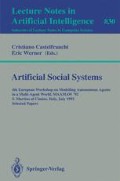Abstract
Agents situated in dynamic environments can be supplied in advance with a repertoire of plans that permit them to rapidly generate appropriate sequences of actions in response to important events. When agents can form teams, new problems emerge regarding the representation and execution of joint actions. In this paper we introduce a language for representing joint plans for teams of agents, we describe how agents can organize the formation of a suitably skilled team to achieve a joint goal, and we explain how such a team can execute these plans to generate complex, synchronized team activity. The formalism provides a framework for representing and reasoning about joint actions in which various approaches to co-ordination and commitment can be explored.
This work was supported in part by the Cooperative Research Centre for Intelligent Decision Systems, the Australian Research Council, and a Generic Industry Research and Development Grant from the Department of Industry, Technology and Commerce, Australia.
Preview
Unable to display preview. Download preview PDF.
References
M. E. Bratman: Shared Cooperative Activity. The Philosophical Review 101, 327–341 (1992)
M. E. Bratman, D. Israel and M. E. Pollack: Plans and Resource-Bounded Practical Reasoning. Computational Intelligence 4, 349–355 (1988)
P. R. Cohen and H. J. Levesque: Intention is Choice with commitment. Artificial Intelligence 42(3), 213–261 (1990)
M. P. Georgeff and A. L. Lansky: Procedural Knowledge. In: Proceedings of the IEEE Special Issue on Knowledge Representation 74, 1383–1398 (1986)
Barbara Grosz and Sarit Kraus: Collaborative plans for Group Activities. In: Proceedings of the Thirteenth International Joint Conference on Artificial Intelligence (IJCAI-93), 367–373 (1993)
J. Y. Halpern and Y. O. Moses: Knowledge and Common Knowledge in a Distributed Environment. Journal of the Association for Computing Machinery 37, 549–587 (1990)
F. F. Ingrand, M. P. Georgeff and A. S. Rao: An Architecture for Real-Time Reasoning and System Control. IEEE Expert 7(6), 34–44 (1992)
David Kinny and Michael Georgeff: Commitment and Effectiveness of Situated Agents. In: Proceedings of the Twelfth International Joint Conference on Artificial Intelligence (IJCAI-91), 82–88 (1991)
H. J. Levesque, P. R. Cohen and J. H. T. Nunes: On Acting Together. In: Proceedings of the Eighth National Conference on Artificial Intelligence (AAAI-90), 94–99 (1990)
G. A. Miller, E. Galanter and K. H. Pribham: Plans and The Structure of Behaviour. Holt, Rinehart and Winston (1960)
E. Osawa and M. Tokoro: Collaborative Plan Construction for Multi-Agent Mutual Planning. In: E. Werner and Y. Demazeau (eds.): Decentralized A.I. 3. North Holland, 169–187 (1992)
A. S. Rao and M. P. Georgeff: Asymmetry Thesis and Side-Effect Problems in Linear Time and Branching Time Intention Logics. In: Proceedings of the Twelfth International Joint Conference on Artificial Intelligence (IJCAI-91), 498–504 (1991)
A. S. Rao and M. P. Georgeff: Modelling Rational Agents Within a BDI-Architecture. In: J. Allen, R. Fikes, E. Sandewall (eds.): Proceedings of the Second International Conference on Principles of Knowledge Representation and Reasoning. Morgan Kaufmann Publishers, 473–484 (1991)
A. S. Rao, M. P. Georgeff and E. A. Sonenberg: Social Plans: A Preliminary Report. In: E. Werner and Y. Demazeau (eds.): Decentralized A.I. 3. North Holland, 57–76 (1992)
J. S. Rosenschein: Rational Interaction: Cooperation Among Intelligent Agents. PhD Thesis. Stanford University (1985)
G. Tidhar: Team Oriented Programming: Preliminary Report. Technical Report 37. Australian Artificial Intelligence Institute (1993)
E. Werner: Cooperating agents: A Unified Theory of Communication and Social Structure. In: L. Gasser, M. N. Huhns (eds.): Distributed Artificial Intelligence: Volume II. Morgan Kaufmann Publishers, 3–36 (1990)
Author information
Authors and Affiliations
Editor information
Rights and permissions
Copyright information
© 1994 Springer-Verlag Berlin Heidelberg
About this paper
Cite this paper
Kinny, D., Sonenberg, E., Ljungberg, M., Tidhar, G., Rao, A., Werner, E. (1994). Planned team activity. In: Castelfranchi, C., Werner, E. (eds) Artificial Social Systems. MAAMAW 1992. Lecture Notes in Computer Science, vol 830. Springer, Berlin, Heidelberg. https://doi.org/10.1007/3-540-58266-5_13
Download citation
DOI: https://doi.org/10.1007/3-540-58266-5_13
Published:
Publisher Name: Springer, Berlin, Heidelberg
Print ISBN: 978-3-540-58266-3
Online ISBN: 978-3-540-48589-6
eBook Packages: Springer Book Archive

